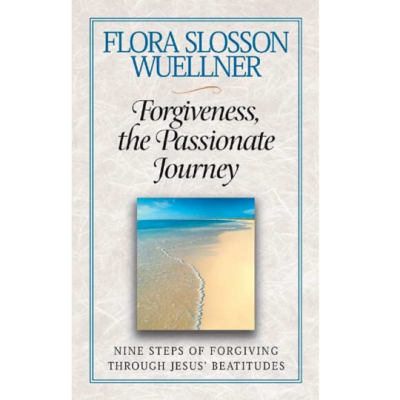
Book Review: Forgiveness, the Passionate Journey Nine Steps of Forgiving through Jesus’ Beatitudes by Flora Slosson Wuellner
“I have told you this so that my joy may be in you and that your joy may be complete” (John 15:11 NIV).
I think most Christians understand that that through the blood of Jesus we have forgiveness for our sins and life everlasting with the Father. However, many of us still struggle with the concept of forgiveness. This book uses the Beatitudes, eight blessings recounted by Jesus in the Sermon on the Mount in the Gospel of Matthew, to point the reader toward Jesus as they travel the path of forgiveness.
This book is helpful for those seeking spiritual growth and insight for healthy, empowered forgiveness of others and forgiveness of ourselves. Each chapter focuses on a Beatitude and concludes with a healing meditation. The meditations help the reader to process their emotions by acknowledging that “hurt, hostility, and healing that is hot and Holy ground.”
I underlined a section in the Introduction that speaks to the Biblical definition of “blessed.” “To be blessed means two things in Scripture: It means to be happy, to be fulfilled. It also means to be empowered by God’s love to undertake a task. The living Jesus Christ not only empowers us for healthy forgiveness but walks the path with us, enfolding us with God’s compassion, praying through the pain “that my joy may be in you, and that your joy may be complete” (John 15:11)
The book explains that the central focus of the Beatitudes is “what is happening in our heart’s core.” In His sermon, Jesus is addressing release from that which imprisons and corrupts our heart. This is important because our words and actions are a manifestation of our heart. Forgiveness is a release from the prison and burden of the past. Forgiveness is not a release from responsibility. As we study and pray and grow closer to Christ we are able to do the things that we cannot do on our own. Through Him we can forgive others and ourselves.
Those that hurt us are often wounded people themselves. We will encounter some people in life that knowingly choose to do evil things to other people. The author states that they are “caught in a prison of self-destruction that almost defies description.” I had not realized that often when people deliberately hurt us they are acting out of a deep inner hurt in themselves. Instead of giving emotional control to our attacker by feeling angry, we are asked to consider feeling pity and wonder what has happened to this person that has caused them to act in such an evil manner? This is not done to minimize the hurt, but to facilitate our healing.
The discussion on self-forgiveness will also be helpful for many. As we learn to listen to our inner selves we also learn to be released from rigid self judgement. The door is opened for healing and transformation that can only be accomplished by God.
The author does not advocate using this book in lieu of professional therapy. The author clearly states in the Introduction that she believes in “prayer plus therapy, especially if the wound, abuse, anger, or fear is deep and longstanding.” The book is available from the Upper Room Bookstore.
Prayer: Thank you for the Sermon on the Mount. Help us to find forgiveness and peace in the Beatitudes of Jesus. Amen.
Meet the Author
Todd Shupe is a Men’s Ministry Specialist through the General Commission of United Methodist Men and is in training to be a Certified Lay Minister through the Louisiana Conference of the United Methodist Church. He currently serves as the President of the Baton Rouge District of United Methodist Men and is a Board Member for Gulf South Men and serves on the Action Team for The Kingdom Group. He is a volunteer for the Walk to Emmaus, Grace Camp, and Iron Sharpens Iron. Todd resides in Baton Rouge, Louisiana.
We welcome your comments below.
Thank you for visiting. We trust that you have enjoyed reading our articles.
Liked this post?
Read more below or search for more topics...
-
Never Grow Tired of Doing Good
Never Grow Tired of Doing Good “Let us not become weary in doing good, for at the proper time we will reap a harvest if we do not give up” (Galatians 6:9 NIV). When I think of “doing good” I often think of John Wesley. One of John Wesley’s most famous quotes was, “Never grow tired of doing good.” I thought of Wesley and his quote as I was reading Galatians 6. This was not a catchy marketing campaign. This was part of his core beliefs which mirrors closely with Paul’s Epistle to the early church in Galatia (Galatians 6:9). Wesley believed that upon... -
Fire Consumes or Purifies
Fire Consumes Or Purifies “When you pass through the waters, I will be with you; and when you pass through the rivers, they will not sweep over you. When you walk through the fire, you will not be burned; the flames will not set you ablaze” (Isaiah 43:2 NIV). One thing that is as certain as death and taxes is that in this fallen world is we will have problems. Jesus said these words in John 16:33 many years ago, but they still ring true today. “In this world you will have trouble. But take heart! I have overcome the world.” To... -
Give to Receive?
Give to Receive? “You will be enriched in every way so that you can be generous on every occasion, and through us your generosity will result in thanksgiving to God” (2 Corinthians 9:11 NIV). Most Christians understand the need for giving. For early Jews and Christians, almsgiving was the act of filling a material need for someone less fortunate, usually by giving money. God incorporated the concept of alms into the Mosaic Law when He ordered land-owners to leave to the poor the corners of the fields (Leviticus 19:9-10), and every seventh year, leave the entire field (Exodus 23:10-11). In churches today, "alms"...










